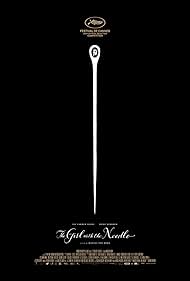She meets Dagmar, who runs an underground adoption agency
Narrative
Copenhagen 1919: A young worker finds herself unemployed and pregnant. A strong connection grows but her world shatters when she stumbles on the shocking truth behind her work.. Official submission of Denmark for the 'Best International Feature Film' category of the 97th Academy Awards in 2025..
When was the rampant drug use of the era portrayed so candidly?
It's the last days of The Great War and Karoline is barely eking out an existence working in a factory. She believes herself to be a widow as her husband disappeared during the war (even though Denmark didn't really participate), but is not getting the benefits for widows because he has not been listed as dead.A lot happens during the movie and I don't want to go into spoilers, so I won't go deeper into the plot except that the marketing is emphasizing something that is not as big a part in the movie as someone might expect.While that does get a lot of attention in the latter half of the movie, to me the real value of the movie is the feeling of reality around Karoline's story. When was the last time someone in a movie was trying to convince a potential tenant to take up an apartment by telling them that they can get running water for two whole hours a day (from ten to noon, which might not be much of a selling point as most people would be working during those hours)?
While Dagmar is a major character, the movie is clearly about Karoline and her hardships
Even what Dagmar is doing was relatively commonplace back in the day, although I would hazard a guess the trend was downward at this point in time and it wasn't happening as much as it had before.I actually might have enjoyed the movie more if the marketing was different and Dagmar wasn't brought up, because it created expectations. On the other hand, it is hard to say how I would have felt seeing the name Dagmar Overby on a door if I hadn't known beforehand that this real life person was used in the movie. (It should be noted that the movie is inspired by real life events rather than based on, so they are trying to maintain a certain distance to the real Dagmar).I do feel some part of the audience will find it hard to symphathize with Karoline, as she does sometimes seem to make the right decision just a little too late.
It's black and white and the whole city seems to be decrepit and barely holding up
At the same time, there isn't that much time or opportunity for ethics when you are just trying to survive in a world where the odds have been stacked against you. On the other hand, while we know the hope she is given would be for nothing in this world, we still understand why she gives into it.I like the look of the film. It reminds us of the lack of interest in the well-being of or even disdain for the working poor.
Have things really changed that much?
The time being depicted happened over a century ago, but the concept of female bodily autonomy is under constant assault again.Of course, all art is in some way a mirror of the time it was made, but it just seems easier to see the similarities here.



 35/48
35/48
Recent Comments